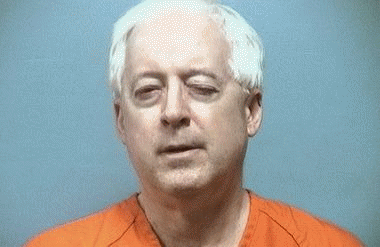(Article changed on March 17, 2014 at 14:52)
Alabama commentator Roger Shuler's condition has sharply worsened during his nearly five months of jailing, as I learned by visiting him in Birmingham March 10.
"It's a horrible trauma to be away from your wife, your home -- and have no idea when you can get out or how," Shuler told me in a rare interview. It was just his second jailhouse interview overall and his only one this year.
Shuler, 57, nearly choked up at the end when he said that he missed his wife -- who is afraid to leave their home (except on secret, emergency food runs) because of the threat she will be arrested for her husband's reporting.
Also, he said that he fears jail violence, and did not want to die from it. He is shown in his mug shot the night of his beating by a Shelby County deputy last October.
The corruption-fighting reporter said he has lost 16 pounds during his jailing without bond since Oct. 23 on two contempt of court charges. The charges stemmed from his investigative reports alleging a sex scandal involving the prominent Alabama lawyer Robert Riley Jr. and lobbyist Liberty Duke.
In the lawsuit filed last summer under seal against the Shulers, Riley and Duke denied Shuler's reports, which were published on the Legal Schnauzer site Shuler founded in 2007 to reveal suppressed and other under-reported stories involving Deep South courts and politics. Riley, Duke and their attorneys have not responded to my requests for further comment.
My visit occurred the day after the 50th anniversary of the nation's most famous free press case in history, New York Times v. Sullivan, which Shuler's judge appears to be violating by holding the reporter indefinitely for failing to spike his stories before trial of the Riley and Duke suits.
My column today shows how Shuler's treatment violates fundamental press freedom and due process law arising in significant part from the 1960s civil rights struggle in Alabama and across the Deep South.
Yet the nation's journalism leaders -- especially those leading media organizations and teaching at universities -- have done virtually nothing to help Shuler either to win freedom or otherwise to preserve the national civil rights precedents being violated in his case.
With a few exceptions, most of these leaders and their entities ignore the dark scandals arising across the nation and focus their energies on First Amendment rhetoric, kow-towing to celebrities in government and the media, and promoting scholarships and other efforts to encourage young people to join an oft-glamorized profession.
As a longtime dues-paying member of several of the nation's leading journalism societies and clubs, I have repeatedly written their leaders without success since October to encourage news articles, panel discussions -- or at least letters of protest regarding the Shuler case and those like it.
For the most part, leaders ignore my letters. A few have emailed me back to plead lack of sufficient interest by their membership in such matters, or else too little funding or time to add their name to a letter of protest to an Alabama court.
To break the cycle of indifference, I travelled last week from my office in the nation's capital to visit Shuler March 10 at the Jefferson County jailhouse serving Birmingham.
This column is entitled "Letter from the Birmingham Jail" to recall the Rev. Martin Luther King Jr.'s 1963 letter while jailed. King called on everyone to take a responsibility to fight injustice. Denied writing materials in Birmingham's jail, King wrote much of his "letter" on the margins of a newspaper and other paper scraps smuggled out.
Next Page 1 | 2 | 3 | 4 | 5 | 6 | 7
(Note: You can view every article as one long page if you sign up as an Advocate Member, or higher).






